
Test results help detect, address shortcomings
5/9/2011
Two walls of Assistant Superintendent Romules Durant’s office are consumed by boards filled with test scores for TPS elementary schools. By the end of the third quarter, he can predict with reasonable accuracy where a school will land on state report cards.
It’s Beth Harrison’s job to catch kids before they fall too far.
Ms. Harrison is an early interventionist at Birmingham Elementary in East Toledo. She pulls out students who are falling behind in class and tutors them in small groups.
Which students to focus on, where they are struggling, and what techniques should be used to help them are driven in large part by data.
Education has become a data-driven endeavor in the past decade. The No Child Left Behind Act has been much maligned for forcing schools to focus so heavily on test results at the expense of more well-rounded learning.
But it has helped usher in an academic approach that catches student struggles early on and forces teachers to assess whether their techniques are working.
The data focus drew hesitation from teachers at first, Ms. Harrison said. “I think data wasn’t explained with the results,” she said. “You have to show it works.”
And teachers in Toledo, at least in the younger grades, say they have bought in.
Although most of the public focus is on one data set — state standardized test scores — educators look at numerous internal scores during the year from computer programs, oral tests, and other assessments.
For instance, teachers have no fewer than three types of data sets to gauge the progress of third graders in reading.
“I see numbers when I shut my eyes,” Ms. Harrison said.
Romules Durant, assistant superintendent for elementary education, sees numbers every time he opens his.
Two walls of his office are consumed by huge white boards, filled from top to bottom with internal test scores for all of Toledo’s public elementary schools.
While the third-grade classrooms are the front lines in Toledo’s school-reform plan, Mr. Durant’s office at the Thurgood Marshall building is in many ways the headquarters.
He pores over reams of data: historical trends in state tests, internal benchmark exams, formative assessment results.
By the end of the third quarter, Mr. Durant can predict with reasonable accuracy where a school will end up on state report cards. He told staff at Birmingham Elementary last year that it would be rated an excellent school months before the state confirmed it.
And yet, bring up test scores with Mr. Durant and he will tell you about how his father can build a deck without blueprints or a high school diploma. He’ll tell you how experiential knowledge is just as important as the ability to take a test.
“Education,” he said, “is how do you make the two connect.”
Contact Nolan Rosenkrans at: nrosenkrans@theblade.com or 419-724-6086.